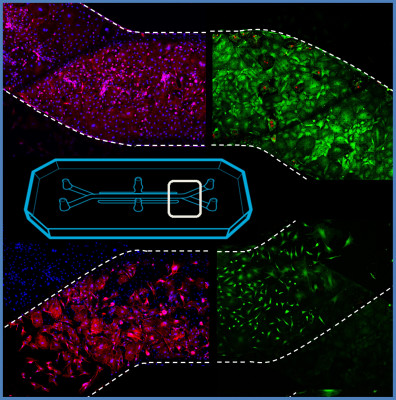News
Queen Mary researchers awarded MRC funding to develop human tendon-on-a-chip technology
10 July 2025

Queen Mary University of London has secured funding from the Medical Research Council (MRC) to launch a pioneering research project aiming to transform the understanding and treatment of tendinopathy—a painful and often chronic tendon condition affecting millions worldwide.
The three-year project, Human Tendon-CHIP, will combine cutting-edge bioengineering, materials science and cellular biology to develop novel human-relevant, vascularised organ-on-a-chip models of tendon disease. The interdisciplinary team is led by Professor Hazel Screen alongside Dr Nidal Khatib at the School of Engineering and Materials Science, as well as collaborators Professors John Connelly and Dr Liisa Blowes at The Blizard Institute, and clinical liaison Professor Xavier Griffin at Queen Mary and Barts Health.
Dr Nidal Khatib, Postdoctoral Research Associate and researcher co-lead on the grant, said:
“Our goal is to develop tendon models which capture how tendons function and get injured using cells extracted directly from human tendon placed in microengineered environments. These ‘tendon-chips’ will allow us to recreate the physical, cellular, and immune landscape of tendon tissue, giving us an unprecedented window into human disease progression and ways to explore possible new treatments.”
The project will be delivered at Queen Mary’s new state-of-the-art in vitro models facilities, which provides access to a range organ-on-a-chip platform technologies as well as the CREATE Lab for advanced tissue engineering.
The project will create two advanced organ-on-a-chip systems. One will use an existing commercial platform to model how tendon cells interact with blood vessels. The other will be a custom-made, three-channel chip developed in-house. This will allow researchers to study different tendon cell types and how they interact with blood and immune cells, which is important due to new findings in tendon biology.
By recreating key physical and inflammatory stimuli that drive tendon disease, the team hopes future research will be able to leverage these novel platforms to identify new disease pathways and potential drug targets. These platforms could offer a breakthrough in drug discovery for tendon disorders, accelerating progress towards effective regenerative treatments while reducing reliance on animal models.
Professor Hazel Screen, lead investigator, commented:
“This project marks a major step forward in tendon research. Our tendon-chips are designed not just to simulate disease but to actively drive it, enabling us to probe its causes and test potential treatments in a controlled, human-relevant system. The initiative also supports Queen Mary’s broader commitment to replacing animal models with more predictive, ethically responsible alternatives for biomedical research.”
The research builds on Queen Mary’s world-leading expertise in organ-on-a-chip technologies, facilitated through its Centre for Predictive in vitro Models. The outcomes have the potential to benefit patients, clinicians, and the wider healthcare system by improving diagnostic precision and supporting the development of targeted, effective therapies.
| Contact: | Nidal Khatib |
| Email: | n.khatib@qmul.ac.uk |
| People: | Nidal KHATIB Hazel SCREEN |




